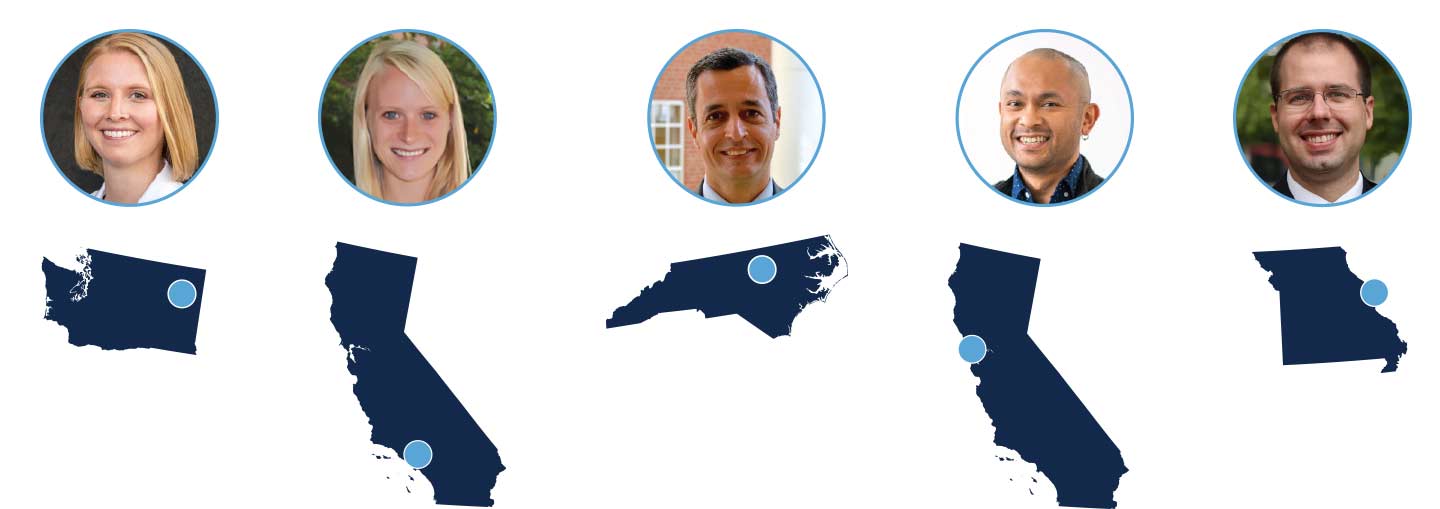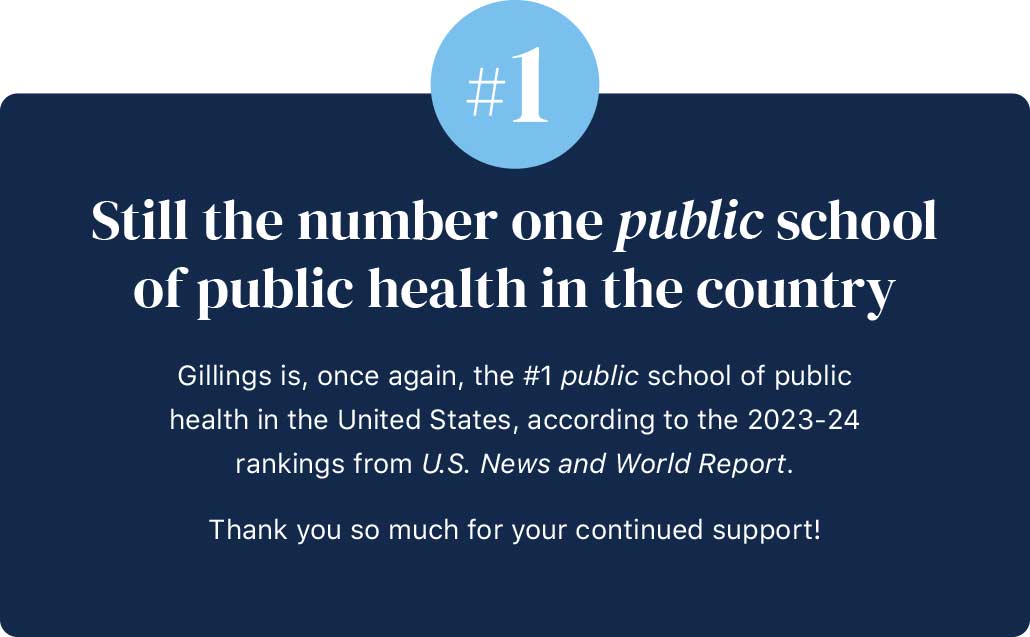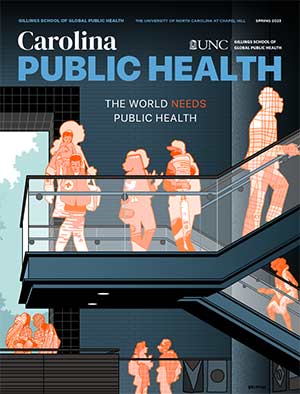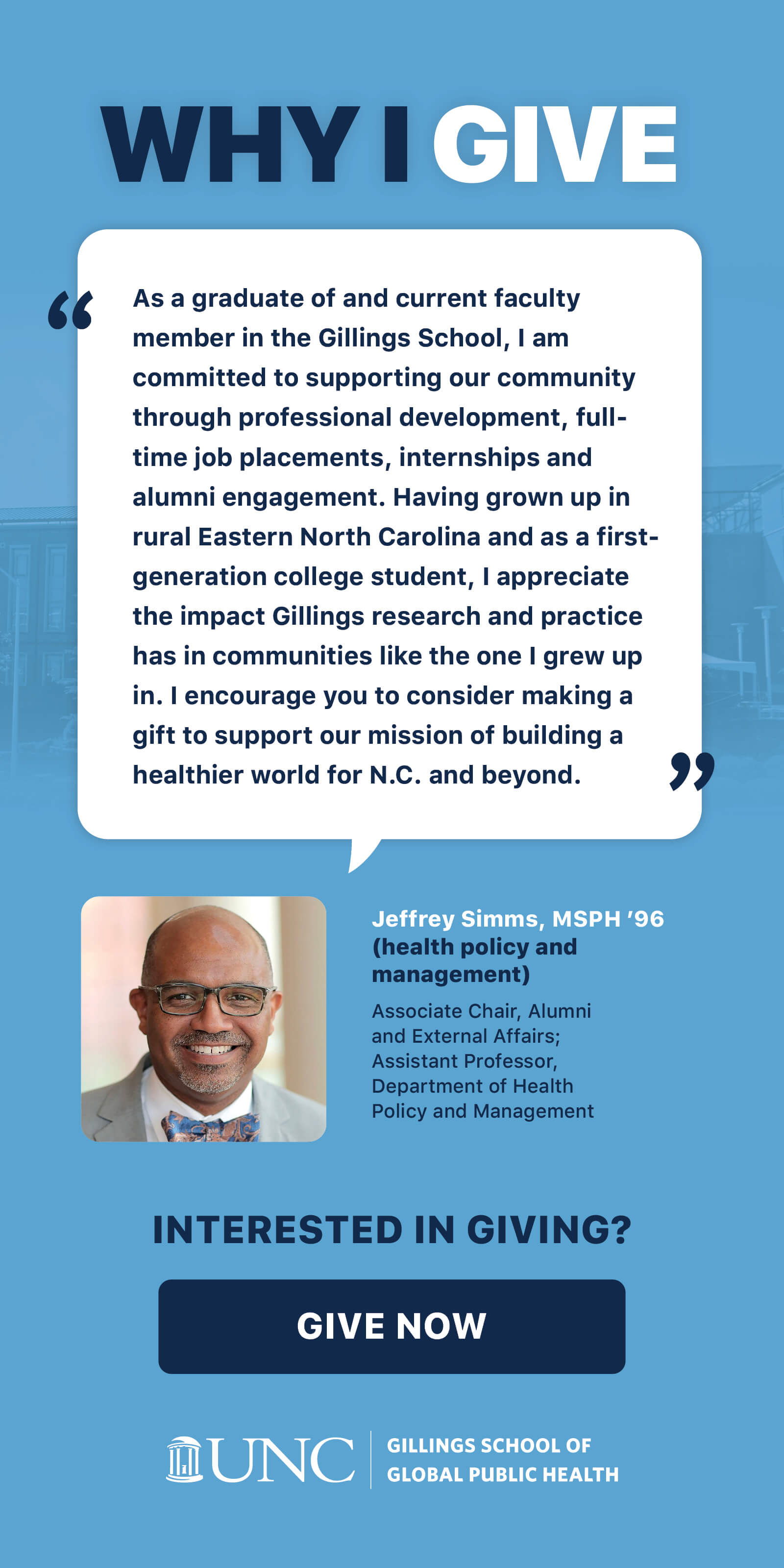UNC Gillings alumni work across the globe in diverse public health roles — from leading institutions to conducting research — and in a range of settings.

Left to right: Emily Grant, MPH ‘21, Spokane, Washington; Arbor Quist, PhD ’21, Los Angeles, California; Dilshad Jaff, MD, MPH ’15, Chapel Hill, North Carolina; Eric Daza, DrPH ‘15, San Mateo, California; David Steeb, Pharm.D, MPH ’17, St. Louis, Missouri
Emily Grant, MPH ‘21 (MPH@UNC)
Medical student in Spokane, Washington
Grant, who is currently seeking a Doctor of Medicine degree, conducted master’s research on the effects of smoke from wildfires that was published in the Journal of Climate Change and Health.
"I was able to finish my degree and contribute to research that I am passionate about, and which will help me better care for my future patients, while still spending precious time with my family.”
Arbor Quist, PhD ’21 (epidemiology)
Postdoctoral researcher, University of Southern California Environmental Health Centers, Los Angeles, California
Quist focuses on the ways disasters related to climate change exacerbate health disparities. As a researcher at the Gillings School, she studied links between hog feeding operations and illness in nearby communities.
Dilshad Jaff, MD, MPH ’15 (Maternal and Child Health)
Gillings Humanitarian Fellow at the UNC Gillings School of Global Public Health, Chapel Hill, North Carolina
Jaff, who has more than 20 years’ experience in complex humanitarian crises in conflict zones in the Middle East and Africa, has explored the mental health needs of internally displaced persons in the Kurdistan Region of Iraq. His research highlighted a “critical need” for mental health services among these populations.
Eric Daza, DrPH ‘15 (Biostatistics)
Lead biostatistician in data science at Evidation Health, San Mateo, California
Daza is a biostatistician and health data scientist who focuses on how to use data from a single person to make inferences about that individual’s health. He publishes a blog called “Stats-of-1” and a podcast “N-of-5 Minutes” exploring this concept.
David Steeb, Pharm.D, MPH ’17 (Public Health Leadership)
Dean, College of Population Health at the University of Health Sciences and Pharmacy, St. Louis, Missouri
As leader of this new school since March 2022, Steeb has the opportunity to shape its priorities and collaborations for the future, with the aim of promoting health equity and improving health outcomes locally and globally.

From left to right: Hope Thomson, MPH ’21, Chapel Hill, North Carolina; Michael Wilson, MPH ‘14, Durban, South Africa; Ronald Aubert, PhD ‘90, Providence, Rhode Island; Ruwaydah Sideek, BSPH ‘20, Philadelphia, Pennsylvania; Emilia Ndely-Ogundipe MHA ’15, Washington, D.C.
Hope Thomson, MPH ’21 (Environmental Sciences and Engineering)
Project director at the UNC Environmental Finance Center, Chapel Hill, North Carolina
After Hurricane Florence brought record rainfall to eastern North Carolina, Thomson worked to understand the true cost of flooding. By focusing on effects typically excluded from damage assessments, for example, costs related to mortgage default, her work will help policymakers develop better strategies for disaster recovery.
Michael Wilson, MPH ‘14 (Health Behavior)
Executive director, Advance Access & Delivery South Africa; co-founder/director, Bellhaven Harm Reduction Centre, Durban, South Africa; adjunct assistant professor, UNC Gillings
Wilson co-founded Bellhaven, the first low-threshold harm reduction center in South Africa providing services daily to more than 200 low-income and unhoused people.
Bellhaven shows the type of transformation possible when a city goes from a punitive approach to one that supports people.”
Ronald Aubert, PhD ‘90 (Epidemiology)
Interim dean, Brown University School of Public Health, Providence, Rhode Island
Since April 2022, Aubert has served as interim dean while Dean Ashish Jha, MD, MPH, is on temporary assignment as White House COVID-19 response coordinator. His career in public health has included research, education, practice and leadership in the public and private sectors.
Ruwaydah Sideek, BSPH ‘20 (Nutrition)
Former care navigator, National Health Corps, Philadelphia, Pennsylvania
After graduation, Sideek, who is now in medical school, worked to build healthy communities by providing essential health education and access to services for people in communities plagued by histories of racial and economic inequity.
Emilia Ndely-Ogundipe MHA ’15 (Health Policy and Management)
White House presidential innovation fellow, Washington, D.C.
As innovation fellow, Ndely-Ogundipe is collaborating with top civil servants and change-makers working within the federal government to tackle some of our nation’s biggest challenges.
— — —
Do you want to share your story in a future issue? [Email us](mailto:email.sph@unc.edu?subject="Where are they now" for CPH Magazine).





